PRINCETON, NJ -- Three months before the election, President Barack Obama gets good marks from Americans for his handling of terrorism, fair marks for education and foreign affairs, but poor marks on immigration and three big economic issues: the federal budget deficit, creating jobs, and the economy generally.
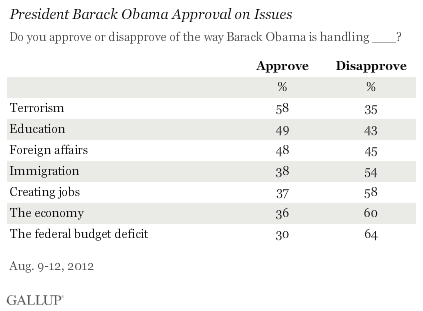
These ratings, from a Gallup poll conducted Aug. 9-12, are similar to Americans' previous ratings of Obama's performance on each issue, as measured in 2011 and early February 2012. Only his approval on terrorism (58%) is down slightly from the peak level (63%) seen last fall after the killing of Libyan President Moammar Gadhafi. Also, his approval on education, at 49%, is up slightly from 41% last August.
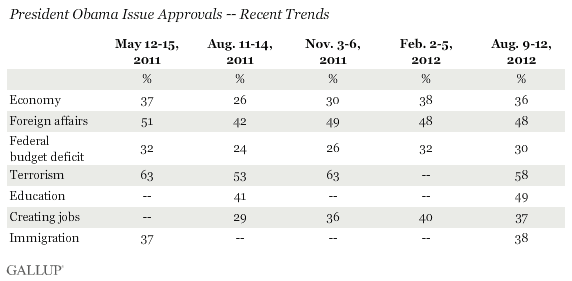
Obama's Economy Ratings Trail Those of Prior Two-Term Presidents
Obama's ratings on the economy are significantly worse than all three prior successful presidential incumbents at this same point in their first term, according to the available Gallup trends. His 36% approval rating on the economy is well below George W. Bush's rating in August 2004 (46%), Bill Clinton's in August 1996 (54%), and Ronald Reagan's in July 1984 (50%). Still, in terms of comparisons to presidents who lost, Obama's economic rating is substantially better than that of George H.W. Bush in July 1992 (18%). Gallup did not measure Americans' approval of Jimmy Carter on the economy in 1980.
Obama's single worst rating of the seven issues measured in the current poll is for the federal budget deficit. However it is unclear how problematic this will be for him. His 30% approval rating on the deficit falls about halfway between Clinton's in August 1996 (43%) and Reagan's in July 1984 (23%).
Gallup initiated the "creating jobs" approval rating in 2009, and thus has no readings on it for previous presidents. However, on the similar item of "unemployment," Reagan earned a 48% approval rating in 1984, higher than Obama's 37% for creating jobs.
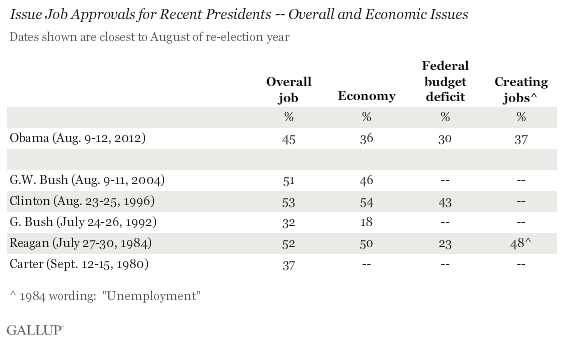
The available historical comparisons are more favorable for Obama on non-economic issues. His 48% approval rating on foreign affairs is among the highest earned by each of the last six elected presidents at this point in their presidencies. It is roughly on par with successful candidates George W. Bush (44%) and Clinton (53%), as well as George H. W. Bush (50%), who lost. Further muddying the interpretation of foreign affairs ratings, two presidents with similarly low ratings on foreign affairs -- Reagan with 38% approval and Carter with 33% -- had markedly different re-election outcomes.
According to Gallup's more limited job approval trends on education and terrorism, Obama's current ratings on both issues are nearly identical to George W. Bush's in August 2004; however, his approval on education is lower than Clinton's was in August 1996.
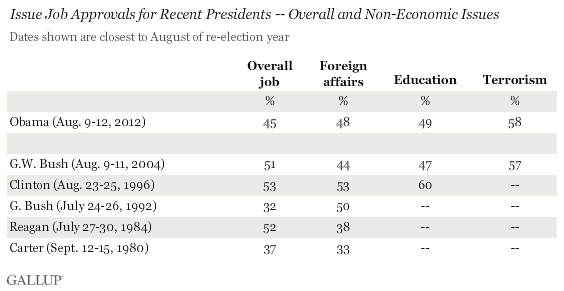
Economy Rating Most Closely Approximates Overall Job Approval
Comparing presidents' various issue approval ratings to their overall job approval ratings from the same polls, it appears that the economy approval rating is consistently the closest to overall job approval, and therefore arguably the most relevant. The only significant separation seen between the two was in July 1992 when George H.W. Bush's economy rating was an exceptionally low 18% compared to his overall job approval rating of 32%. By contrast, Gallup has typically seen presidents' overall job ratings run substantially higher than their approval on the federal budget deficit -- particularly with Reagan in 1984.
The relationship between a president's overall job approval rating and his approval rating on foreign affairs has varied, with the foreign affairs rating sometimes significantly higher than overall job approval and sometimes significantly lower. There are too few measures of other issue ratings to draw meaningful conclusions about their connection to overall job approval.
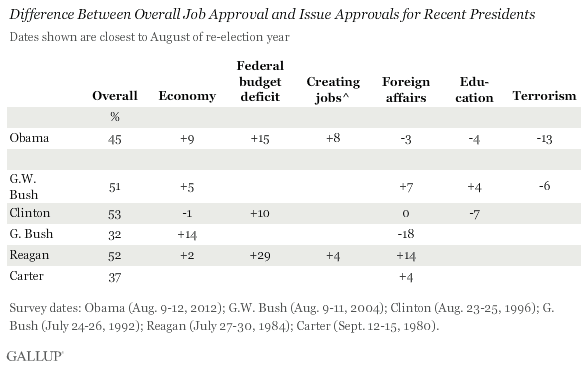
Bottom Line
Nearly six in 10 Americans approve of Obama's handling of terrorism; however, that is where majority approval of the president ends in the current poll. He earns his lowest issue ratings on the economic issue areas tested in the survey, with approval on the federal budget deficit the lowest at 30%, and his approval on the economy not much higher, at 36%.
While Obama's issue ratings are largely unchanged from where they have been over the past year, that stability may be a problem given his overall job approval rating is 45%. Historically, presidents who won a second term had near-50% job approval ratings or better prior to the election. To move closer to that range, Obama may want to focus singularly on raising his approval rating on the economy, as with previous presidents it seems to have been the issue approval most closely linked to overall job approval.
Explore President Obama's approval ratings in depth and compare them with those of past presidents in the Gallup Presidential Job Approval Center.
Survey Methods
Results for this Gallup poll are based on telephone interviews conducted Aug. 9-12, 2012, with a random sample of 1,012 adults, aged 18 and older, living in all 50 U.S. states and the District of Columbia.
For results based on the total sample of national adults, one can say with 95% confidence that the maximum margin of sampling error is ±4 percentage points.
Interviews are conducted with respondents on landline telephones and cellular phones, with interviews conducted in Spanish for respondents who are primarily Spanish-speaking. Each sample includes a minimum quota of 400 cell phone respondents and 600 landline respondents per 1,000 national adults, with additional minimum quotas among landline respondents by region. Landline telephone numbers are chosen at random among listed telephone numbers. Cell phones numbers are selected using random digit dial methods. Landline respondents are chosen at random within each household on the basis of which member had the most recent birthday.
Samples are weighted by gender, age, race, Hispanic ethnicity, education, region, adults in the household, and phone status (cell phone-only/landline only/both, cell phone mostly, and having an unlisted landline number). Demographic weighting targets are based on the March 2011 Current Population Survey figures for the aged 18 and older non-institutionalized population living in U.S. telephone households. All reported margins of sampling error include the computed design effects for weighting and sample design.
In addition to sampling error, question wording and practical difficulties in conducting surveys can introduce error or bias into the findings of public opinion polls.
For more details on Gallup's polling methodology, visit www.gallup.com.
